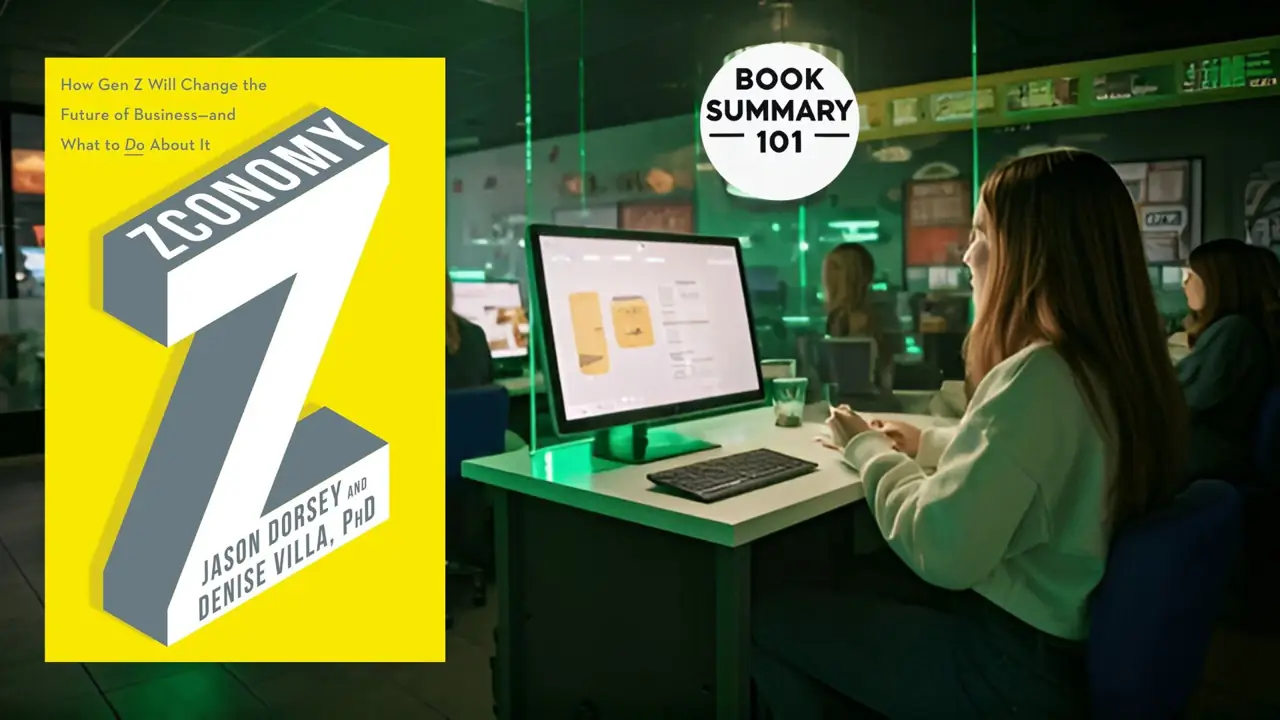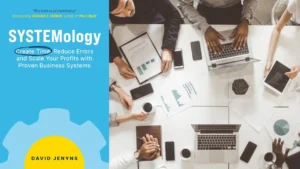I remember the exact moment I realized I was officially “out of touch.”
I was sitting across from a 23-year-old job candidate. On paper, she was perfect. But when I started talking about our standard 9-to-5 structure, the benefits package I thought was generous, and our “pay your dues” career ladder, I saw her eyes glaze over.
It wasn’t disrespect. It was a total disconnect.
I felt like I was speaking Latin, and she was listening in Emoji. She politely declined the second interview.
I went home frustrated. Was I becoming a dinosaur? Was this generation just impossible to please?
That’s when I stumbled upon “Zconomy: How Gen Z Will Change the Future of Business” by Jason R. Dorsey and Denise Villa.
I opened it expecting a lecture on how to deal with “entitled kids.” Instead, I found a data-driven, empathetic, and incredibly practical roadmap. It felt less like a textbook and more like a wise friend sitting me down and saying, “Hey, the world has changed. Here is your new GPS.”
If you’ve ever felt confused by the generation born between 1996 and 2015, this post is for you.
- Why Should You Even Bother Reading It?
- The Tectonic Shift – Seeing the World Through Z-Tinted Glasses
- 1. Digital Dependents: Technology as Oxygen
- 2. The “Phigital” Reality
- 3. The 8-Second Filter (It’s Not ADHD)
- 4. Financial Pragmatism: The Children of the Recession
- 5. Diversity is the Baseline (Not a Bonus)
- My Final Thoughts
- Join the Conversation!
- Frequently Asked Questions (The stuff you’re probably wondering)
Why Should You Even Bother Reading It?
Honestly? Because you can’t afford not to.
Whether you are a CEO, a marketing manager, a small business owner, or just a parent trying to understand why your teenager buys vintage clothes on an app, this book is essential.
Gen Z isn’t just “the next Millennials.” They are a completely different species, shaped by different traumas and technologies. They are rapidly becoming the most influential consumers and employees in the economy.
If you ignore the insights in Zconomy, you aren’t just missing out on a trend; you’re risking obsolescence. This book bridges the gap between “kids these days” and “future market leaders.”
The Tectonic Shift – Seeing the World Through Z-Tinted Glasses
We need to stop looking at Gen Z as “Mini-Millennials” or “Tech-Addicted Teenagers.” Those labels are lazy, and frankly, they’re wrong.
Dorsey and Villa argue that to understand Gen Z, you have to understand the water they swim in. They didn’t just adopt technology; they were born into it. They didn’t just witness social change; they are driving it as a survival mechanism.
Below, I’ve distilled the book’s massive amount of data into the five most critical concepts you need to know.
1. Digital Dependents: Technology as Oxygen
Imagine you are a fish. You don’t think about the water. You don’t say, “I’m going to go into the water now.” You just are in the water. If the water disappears, you panic.
For previous generations, the internet was a destination—a place we “went to” by sitting at a desktop computer and dialing up. For Gen Z, technology is oxygen.
Zconomy explains that Gen Z are not just “digital natives” (a term often applied to Millennials); they are mobile natives. They have never known a world without a smartphone.
The book uses the analogy of an invisible extension of the body. To Gen Z, a smartphone isn’t a tool; it’s a limb. When a business has a clumsy website or lacks a mobile app, it’s not just an inconvenience to a Gen Z consumer. It feels like someone cut off their oxygen supply. It feels broken.
Real-World Example:
Think about Uber. A Gen Z customer doesn’t marvel that a car shows up when they press a button. They expect it. If they have to call a dispatcher to get a taxi, that business effectively doesn’t exist to them. It’s too much friction. If your business isn’t seamless on mobile, you are invisible.
Simple Terms: Gen Z doesn’t distinguish between “online” and “offline”; the internet is just the background operating system of their lives.
The Takeaway: If your mobile experience isn’t flawless and intuitive, you have already lost the Gen Z customer before you even said hello.
2. The “Phigital” Reality
This is one of my favorite concepts in the book. It sounds like a made-up buzzword, but stick with me—it’s brilliant.
Think of a Revolving Door.
For Boomers and Gen X, there is “The Real World” (brick-and-mortar stores, face-to-face meetings) and “The Digital World” (Amazon, Zoom). We step through the door from one to the other.
For Gen Z, the door is spinning so fast it’s a blur. They live in a “Phigital” world—a seamless blend of Physical and Digital.
They might walk into a physical store (Physical) to check the fit of a pair of jeans, while simultaneously video chatting a friend to show them (Digital), price checking the item on Amazon (Digital), and then buying it at the register with Apple Pay (Phigital).
The authors explain that businesses often silo these teams—the “E-commerce team” sits on one floor, and the “Retail Operations team” sits on another. To Gen Z, this separation is baffling. They expect the experience to flow like water between the two states.
📖 Quote from the Book:
“Gen Z sees the physical and digital worlds as one continuous experience. They don’t switch between them; they inhabit both simultaneously.”
Real-World Example:
Look at Target. They nailed the Phigital experience by allowing customers to buy on the app and do “Drive Up” pickup. The digital transaction creates a physical action within two hours. It’s fluid. If a store says, “Oh, that’s an online-only price, we can’t match that here,” they have broken the Phigital contract.
Simple Terms: The barrier between what happens on a screen and what happens in person has completely dissolved.
The Takeaway: Your physical presence and digital presence must look, feel, and act like one single ecosystem, or Gen Z will view you as disjointed and outdated.
3. The 8-Second Filter (It’s Not ADHD)
There is a nasty rumor that Gen Z has a short attention span. People say, “They can’t focus for more than 8 seconds!”
Zconomy flips this idea on its head. It’s not that they can’t focus; it’s that they have a highly sophisticated Spam Filter.
Think of Gen Z as a High-Speed Editor in a film room. They are bombarded with more information in a day than previous generations received in a month. To survive this noise, they have developed an 8-second filter.
They give you 8 seconds to prove you are relevant, entertaining, or valuable. If you pass the filter, they can hyper-focus for hours (just look at how long they can binge-watch Netflix or play video games). If you fail the filter, you are swiped away.
The analogy here is a Bouncer at an Exclusive Club. You don’t have time to read your whole resume to the bouncer. You have to look the part and say the password immediately, or you stay outside.
Real-World Example:
TikTok is the ultimate manifestation of this. A video has roughly 3 seconds to hook a viewer before they swipe up. Successful brands on TikTok don’t do long intros. They start with the punchline. If you are writing a blog post or an email to a Gen Z employee, and you take three paragraphs to get to the point, you’ve been filtered out.
Simple Terms: It’s not an attention deficit; it’s a relevance filter used to manage information overload.
The Takeaway: You must front-load your value. Get to the point immediately, or you won’t get the chance to speak at all.
4. Financial Pragmatism: The Children of the Recession
This was a huge eye-opener for me. We often think of young people as financially irresponsible. But Gen Z is actually incredibly pragmatic—and fearful.
Why? Because they watched their Gen X and Millennial parents struggle through the Great Recession of 2008.
Imagine a puppy trained with a spray bottle. Even if the puppy didn’t do anything wrong, if it sees the other dogs getting sprayed every time they spend money, the puppy learns to be scared of spending.
Gen Z saw their parents lose jobs, houses, and savings. As a result, they are saving money earlier than any previous generation. They are skeptical of student debt. They love thrift stores (not just for style, but for value).
This drives the “Side Hustle” culture. They don’t trust that one employer will keep them safe (because they saw their dad get laid off after 20 years). So, they diversify their income streams like an investment portfolio.
Real-World Example:
Depop and Poshmark. These aren’t just shopping apps; they are business platforms. A Gen Z teen doesn’t just buy a jacket; they think, “I can wear this for three months and resell it for 80% of what I paid.” They are constantly thinking about asset value and liquidity.
Simple Terms: Gen Z treats their finances and career with a “survivalist” mindset, valuing savings and multiple income streams over loyalty to a single company.
The Takeaway: If you want to hire them, offer financial stability and benefits education. If you want to sell to them, emphasize value and durability, not just flashiness.
5. Diversity is the Baseline (Not a Bonus)
For Boomers and Gen X, diversity was often an initiative—a goal to work toward.
For Gen Z, diversity is Gravity. It’s just… there. It is the natural state of the world.
Zconomy highlights that Gen Z is the most diverse generation in history. When they see a company board that is all white and male, or a marketing campaign that only features one body type, it doesn’t just look “not inclusive”—it looks fake.
The analogy here is Tap Water. You don’t walk into a restaurant and praise them for having clean water. You expect it. But if the water is brown, you leave immediately and call the health inspector.
Gen Z doesn’t give you “cookie points” for being diverse. They expect it as the bare minimum. If you lack it, you seem suspicious and out of touch with reality.
📖 Quote from the Book:
“For Gen Z, diversity and inclusion are not preferences; they are requirements. They vote with their wallets and their job applications based on a company’s values.”
Real-World Example:
Fenty Beauty by Rihanna. When it launched with 40 shades of foundation, the beauty industry was shook. Gen Z didn’t see this as a “political statement”; they saw it as common sense. Why wouldn’t you make makeup for everyone? Brands that fail to reflect the real world in their advertising get “canceled” because they are seen as rejecting reality.
Simple Terms: Inclusivity isn’t a PR move; it’s the standard operating procedure for this generation.
The Takeaway: Stop patting yourself on the back for diversity initiatives and start ensuring your company actually looks like the world Gen Z lives in.
My Final Thoughts
Reading Zconomy didn’t just help me understand the young candidate who turned down my job offer; it helped me understand the future of the world.
It’s easy to be intimidated by the pace of change. It’s easy to feel like the “old guard.” But Dorsey and Villa do a wonderful job of showing that Gen Z isn’t trying to destroy the old ways out of malice. They are simply adapting to a high-speed, high-pressure world.
Once I stopped resisting these changes—the Phigital blending, the need for speed, the demand for authenticity—I realized something exciting. These changes actually make business better. They force us to be more honest, more efficient, and more inclusive.
And that’s a future I’m happy to be a part of.
Join the Conversation!
I’d love to hear from you. Have you had a specific “Ok Boomer” moment where you realized you completely misunderstood a Gen Z employee or customer? Drop your story in the comments below—let’s learn from each other!
Frequently Asked Questions (The stuff you’re probably wondering)
1. Is this book only for big corporate types?
Not at all. While it uses big data, the advice is perfect for small business owners, teachers, and even parents who just want to understand what makes their kids tick.
2. Do I need to be tech-savvy to understand it?
Nope. The authors explain tech concepts (like AI and algorithm filters) in very plain English. If you can use a smartphone, you can understand this book.
3. Is this just a list of complaints about young people?
Zero percent. The tone is incredibly positive and empathetic. It advocates for Gen Z, explaining the “why” behind their behavior rather than judging it.
4. Does it cover how to manage/hire Gen Z?
Yes, extensively. There is a large section of the book dedicated specifically to recruiting, retaining, and motivating Gen Z employees, which is worth the price of the book alone.
5. What is the biggest difference between Millennials and Gen Z?
According to the book, it’s the parenting and the economy. Millennials were raised during a boom by optimistic Boomers. Gen Z was raised during a recession by skeptical Gen Xers. This makes Gen Z much more practical and financially conservative than Millennials.



